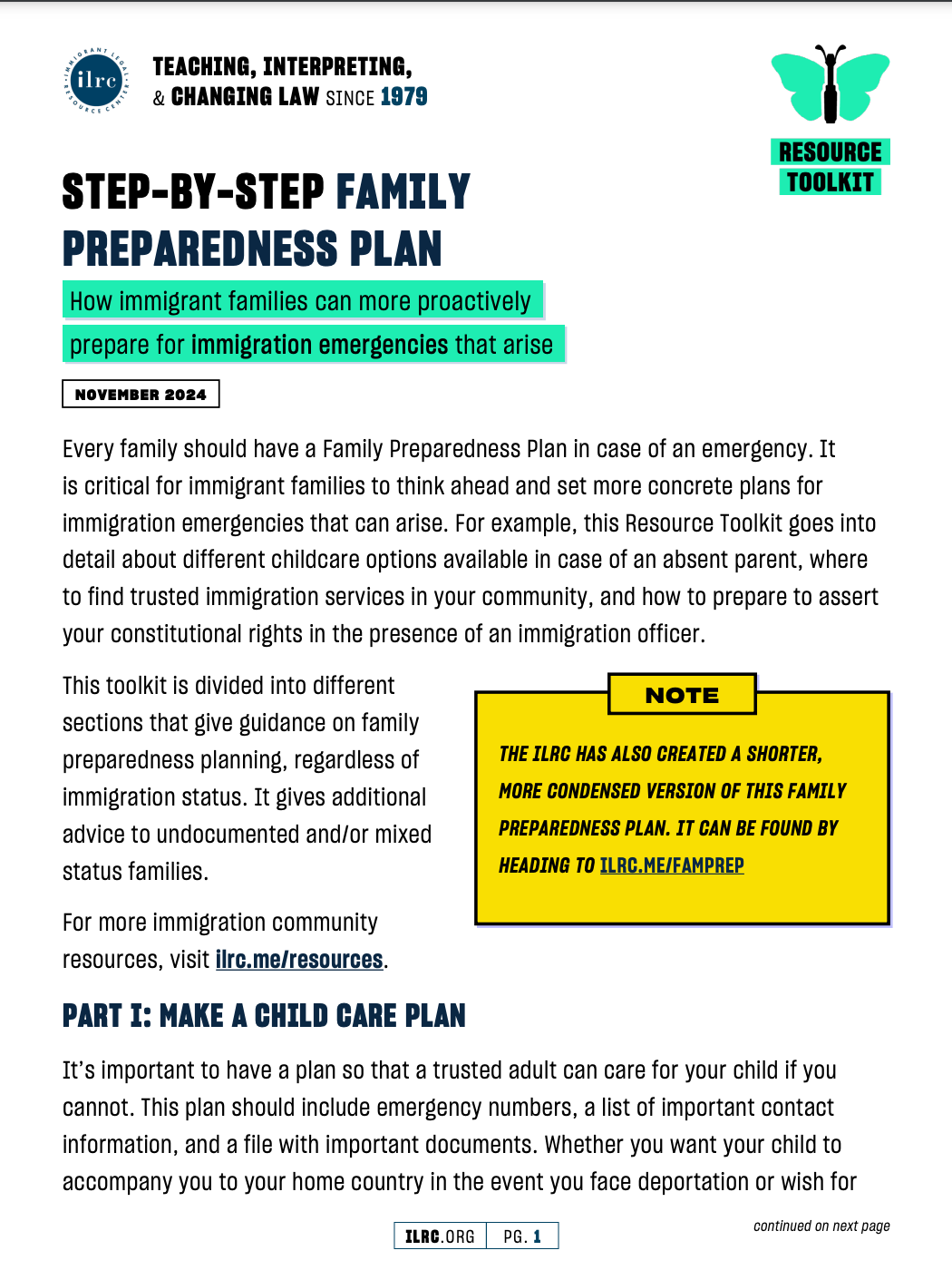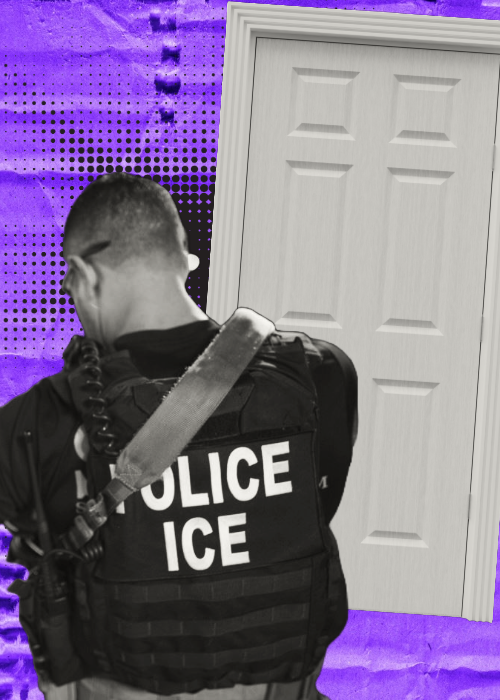Fire & I.C.E.
The consensus among scientists is clear: the average global temperature is warming rapidly causing erratic weather patterns. Californians feel this in the hotter, drier summers, and familiar seasons we once enjoyed are giving way to a near year-round summer. On the southern coastline, fierce Santa Ana winds create the perfect conditions for wildfires to erupt.
As countless Angelenos sift through the ashes of their homes, another storm is being fought in LA and across the country, including our Central Valley, as the new administration pushes to fulfill Trump’s promise of mass deportations.
Since fires have become an inevitable part of the California experience, officials urge people to create a "Wildfire Action Plan". And as U.S. Immigration and Customs Enforcement (I.C.E.) operations intensify, evolve, and become more unpredictable, many residents face a greater risk of detainment. In the case of I.C.E., there is the "Family Preparedness Plan".
Knowing Your Rights, Having a Plan
Having a deep understanding of your rights protected by the Constitution and vehemently asserting them can be effective when evading detainment and expedited deportation. The popular “red cards” summarize these rights, and have been and will continue to be an important tool in case of I.C.E. or Border Patrol confrontation.
Ideally, in the instance of confrontation by an officer, you assert your rights and they are honored and respected. Unfortunately, this is not always the case.
There is no denying that it is hard for most to talk about the possibility of a catastrophe. The dissonance it brings can be unbearable. People generally don’t want to think that it can happen to them.
The fear people are feeling is valid and understandable. While this is true, we must act. We must make a plan.
Central Valley Organizations Ramp Up Defenses
Since November of last year, immigration rights organizations, coalitions, and advocates have been preparing to ramp up defenses for migrants in the Central Valley.
“We are having conversations with community-based organizations with impacted community members to make sure that we have strategies in place and families are prepared,” said Suikana Hussain, on November 8th, 2024, just days after the presidential election results.
Organizations like the Immigration Legal Resource Center (ILRC), Central Valley Immigrant Integration Collaborative (CVIIC), SIREN, among countless others offer information, resources, and solidarity for migrants and advocates. An important resource created by the ILRC that can help people prepare for the worst is the Family Preparedness Plan.
The Family Preparedness Plan
The Family Preparedness Plan can be used by anyone who is living in the United States unauthorized. The first section is especially important for mixed-status families who may be confronted with the devastating circumstance of forced separation.
“...it's a plan to help families outline a plan, should there be contact with immigration agents, detention, something like that,” said Alison Davenport, Senior Managing Attorney with the Immigration Legal Resource Center (ILRC), at the November 8th press conference.
The plan has been discussed at press conferences and immigration rights collaborative meetings. It is also a popular toolkit shared at Know Your Rights sessions and workshops.
“ILRC has put out a great plan that helps guide you on how to prepare for (family separation). It is not offering up your legal rights over your child, but allowing someone else to be able to provide support and guidance for your child while you are separated from them.” said Mario Gonzalez at a press conference on January 11, 2025.
The ILRC website states, “Every family should have a Family Preparedness Plan in case of an emergency. It is critical for immigrant families to think ahead and set more concrete plans for immigration emergencies that can arise.”
Having an abstract plan is the first step, but we need to emphasize the word concrete from the ILRC’s statement above. This echoes our community’s knowledge of the Red Cards before they became more common knowledge, accessible, and people physically had them in their hands.
View, Print, and Digitally Complete the Plan

The toolkit is categorized into four sections to help break down ways to be prepared if you are detained and/or deported. Reviewing them one at a time can help if the information seems overwhelming. The four sections are:
- Haga un plan de cuidado infantil / Make a childcare plan
- Conozca sus opciones de inmagracion / Find out about your immigration options
- Conozca sus derechos / Know Your Rights
- Recursos adicionales / Addendums (FAQ and important documents mentioned in toolkit)
Link to plan in Spanish | English
The plan can be filled out digitally, saved on a device, and emailed to people close to you. You can print the plan if you prefer a physical copy. If access to a printer is a barrier, San Joaquin Valley Libraries offer printing services for 10 cents a page. Another option is to view the Family Preparedness Plan online and use the documents, checklists, and other materials in section 4 as templates to be copied.
The Privilege of (Legal) Citizenship
“To acknowledge privilege is the first step in making it available for wider use. Each of us is blessed in some particular way, whether we recognize our blessings or not.”- Audre Lorde
Audre Lorde believed it is the responsibility of those with privilege in a given area to use this to create change for those who are without. And Kimberly Crenshaw defined intersectionality as the idea that all oppression is connected. This is what is meant when people say nobody is free until everyone is free.
If you have legal citizenship, this is a privilege. If you consider yourself a feminist, an anti-racist, an advocate for people with disabilities or any other area that is disenfranchised by our current system, we must support the cause of all other areas, whether this be actively participating in change or when perpetuating the collective consciousness and beliefs that contribute to change.
In regard to the current fire of immigration, if you have the privilege of citizenship, this means doing work for those who are “in the shadows”, those close to home that fear going to work, sending their children to school, or even going to doctor’s appointments.
With knowledge there is power. Those with the knowledge and privilege of citizenship have a responsibility to those who do not.
Call to action: share your knowledge with your circle, your family, and your community, especially those who are less likely to have access to the information being circulated on social media. Start with empowering them with the knowledge of their rights and how to assert them.
Read more in the article FresKNOW Your Rights: Red Cards.
More resources available in the FresKNOW Your Rights: Resource Guide
Support our work!
At uSpark, human rights are at the heart of our reporting, setting us apart from other news outlets. We’re here to stand with our community, speak up, and call out injustice—no sidelines for us. But we can’t do it alone. Help us reach our goal for 2025!

